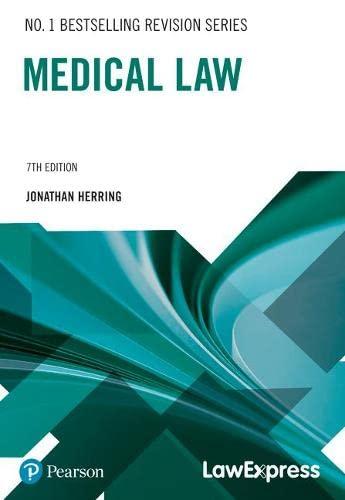Question
1. Ron and Harry are repairing an electrical component at a work tower on a job site. Ron goes to the top of the tower
1. Ron and Harry are repairing an electrical component at a work tower on a job site. Ron goes to the top of the tower where the work will be completed.
Unfortunately, Ron negligently grabs a live electric wire, receives a strong electric shock, and, as a consequence, drops his tool from the tall tower, which lands on the head of Ginny who is standing below the tower to guide Ron's work and who is not wearing a work helmet. Ginny suffers significant injuries.
Which of the following would Ron most likely argue to limit the damages that he should have to pay to Ginny for her injuries? [Select the one best answer]
- A. Contributory or comparative negligence
- B. Lack of proximate cause
- C. Lack of cause in fact
- D. Lack of privity of contract
- E. The Oxford comma rule
2. Imagine that you see the following clause in a contract that you are about to sign as Contractor:
The Contractor and Owner waive Claims against each other for consequential damages arising out of or relating to this Contract. This mutual waiver includes:
- damages incurred by the Owner for rental expenses, for losses of use, income, profit, financing, business and reputation, and for loss of management or employee productivity or of the services of such persons; and
- damages incurred by the Contractor for principal office expenses including the compensation of personnel stationed there, for losses of financing, business and reputation, and for loss of profit except anticipated profit arising directly from the Work.
Which of the following is completely true if the parties wish to avoid a dispute later?
- A. Inclusion of this clause is better than silence on the issue of consequential damages AND this clause would be improved if the parties, in addition to specifying what constitutes consequential damages, would also specify what constitutes direct damages.
- B. Inclusion of this clause is better than silence on the issue of consequential damages AND this clause would be improved if the parties did not specify what constitutes consequential damages.
- C. The Owner and Contractor would be better off remaining silent on the issue of consequential damages AND they should instead include only a liquidated damages clause.
Step by Step Solution
There are 3 Steps involved in it
Step: 1

Get Instant Access to Expert-Tailored Solutions
See step-by-step solutions with expert insights and AI powered tools for academic success
Step: 2

Step: 3

Ace Your Homework with AI
Get the answers you need in no time with our AI-driven, step-by-step assistance
Get Started


